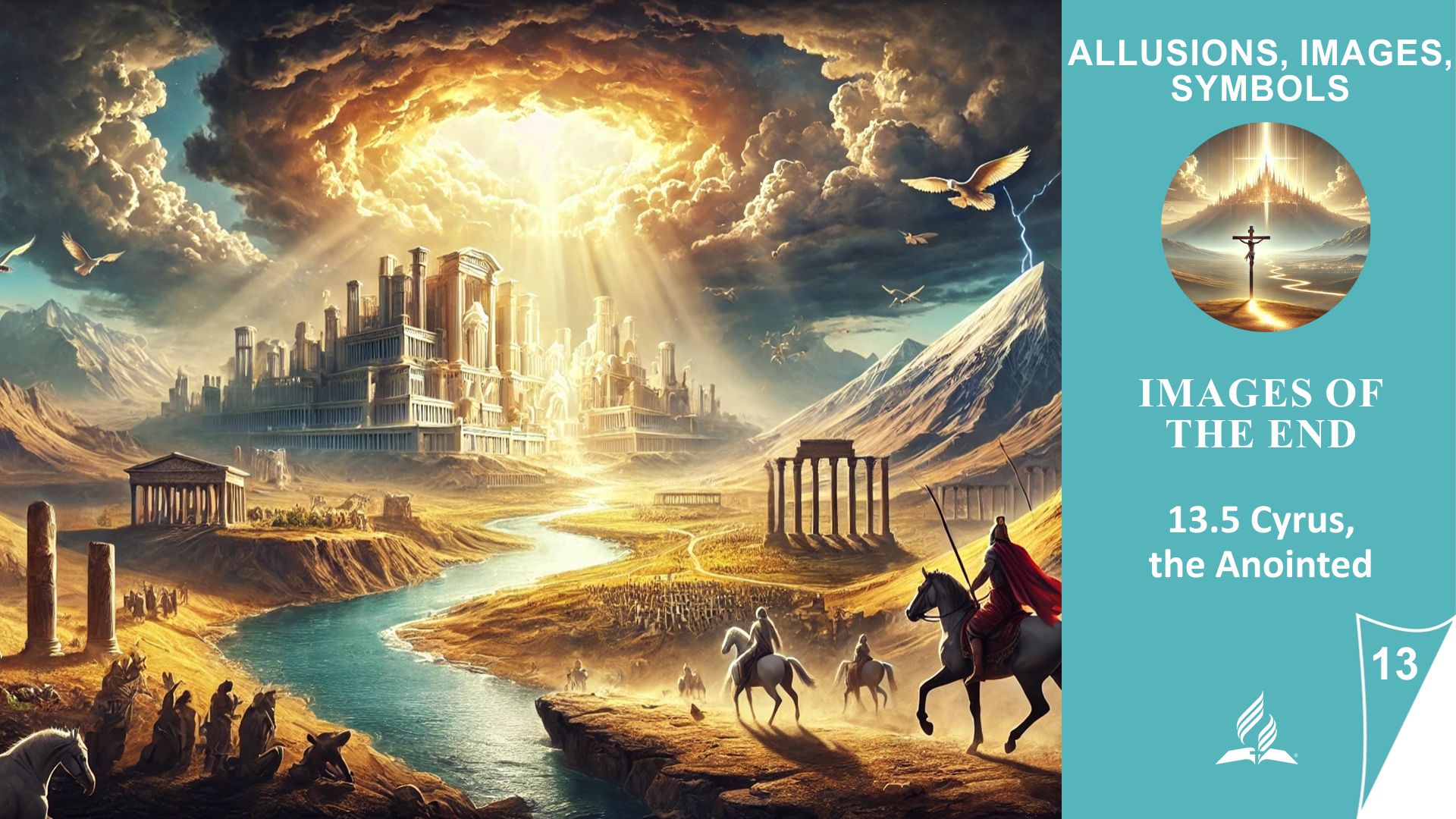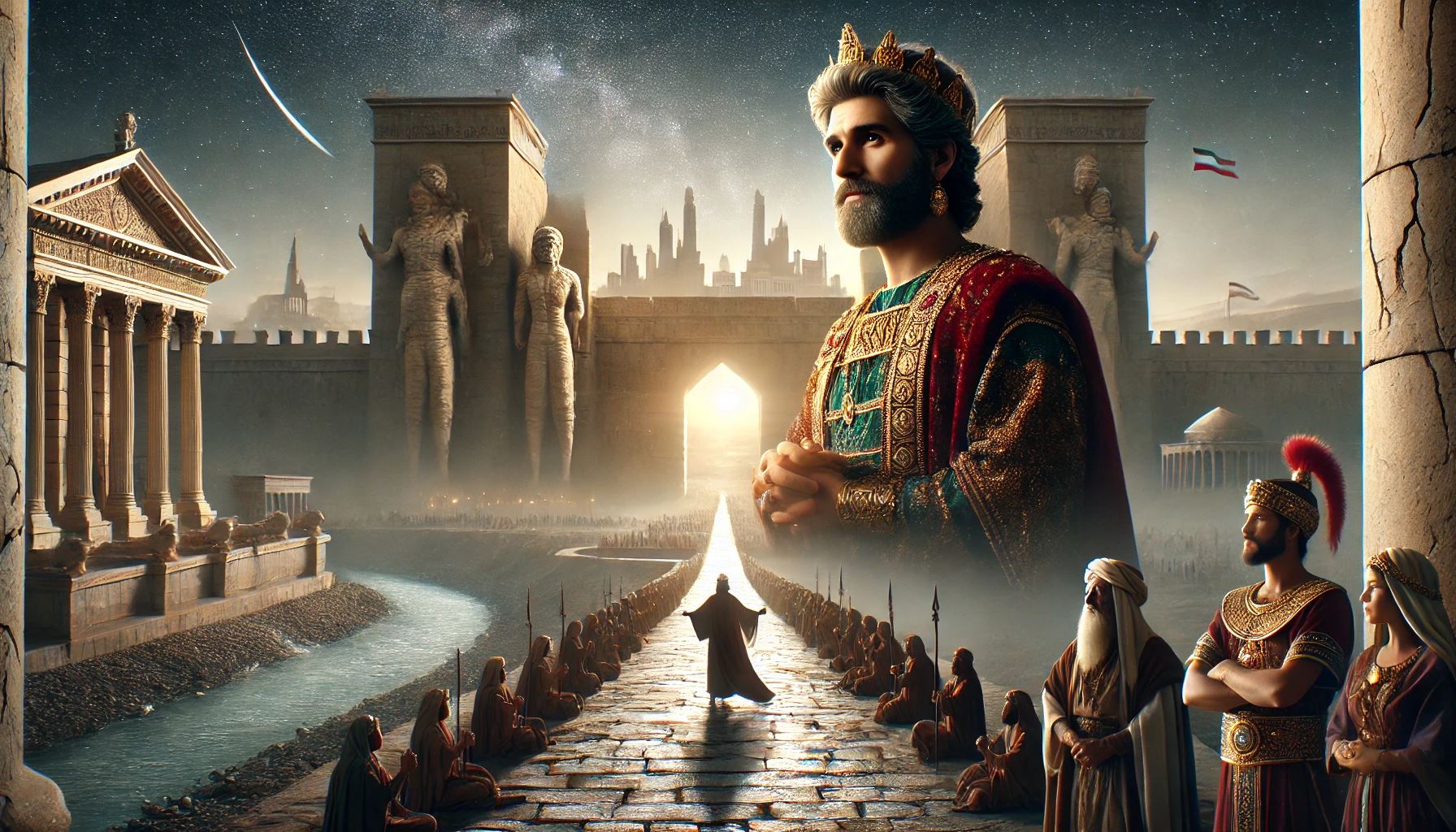


⛪ Lesson 13: IMAGES OF THE END
📘 13.5 Cyrus, the Anointed
✨ Cyrus – A Pagan King as a Foreshadowing of the Redeemer
………………………………………………………………….
🟦 Introduction
The story of Cyrus, the Persian king, is a fascinating chapter of divine providence. Though he was not an Israelite, God used him powerfully—not only to liberate His people but also as a prophetic image of something far greater: the second coming of Christ.
Cyrus does not represent human greatness or military triumph, but God’s sovereign plan—one that sometimes uses instruments we would never expect. The victory over Babylon through Cyrus was not just a historic moment, but a prophetic preview of the ultimate deliverance Christ will bring to His church.
………………………………………………………………….
📖 Bible Study – Cyrus: God’s Anointed and a Foreshadowing of Christ
1. The Historical Cyrus – Who Was He?
Cyrus II, also known as Cyrus the Great, ruled from around 559–530 B.C. and founded the Persian Empire. His conquest of Babylon in 539 B.C. not only ended the reign of the Chaldeans but also marked the beginning of a new chapter for God’s people.
Key text: Isaiah 45:1–5
“Thus says the Lord to his anointed, to Cyrus… I have grasped him by his right hand… to subdue nations before him.”
What’s astonishing?
This prophecy comes from Isaiah’s time—over 150 years before Cyrus was born! God calls him “his anointed” (Heb. mashiach, like “Messiah”)—a title usually reserved for Israelite priests, kings, or for Christ Himself.
Why would God call a pagan king “His anointed”?
Because Cyrus was a tool of liberation in God’s hands—a type, a foreshadowing of the great Redeemer, Jesus Christ.
2. Divine Intervention – The Fall of Babylon
On the night of Daniel 5, while Belshazzar mocked God and used the sacred temple vessels, Persian troops entered under Babylon’s walls. They had diverted the Euphrates River—the city’s lifeline.
This was not a coincidence but the fulfillment of prophecy:
📌 Jeremiah 50:38
“A drought upon her waters, that they may dry up!”
📌 Isaiah 44:27–28
“I say to the deep, ‘Be dry!’… I say of Cyrus, ‘He is my shepherd!'”
Cyrus didn’t destroy Babylon. He took it almost without a fight—in a single night—fulfilling God’s plan.
3. The Decree – Return and Rebuilding
📌 2 Chronicles 36:22–23
📌 Ezra 1:1–4
“Thus says Cyrus king of Persia: The Lord, the God of heaven, has given me all the kingdoms of the earth… and has charged me to build Him a house at Jerusalem.”
This decree allowed:
-
The return of exiles to Judah
-
The rebuilding of the Temple
-
And marked the final stage leading to the coming of the Messiah
Connection to Christ:
No return → No temple
No temple → No priestly sacrifice
No sacrifice → No preparation for the Messiah
Cyrus’ decree is therefore a historical milestone in God’s plan of salvation.
4. Typology – Cyrus and Christ: Parallels
| Cyrus | Christ |
|---|---|
| Anointed (Isa. 45:1) | The true Anointed One (Luke 4:18) |
| Came from the East (Isa. 41:2) | Will come from the East (Matt. 24:27) |
| Conquered Babylon | Will destroy spiritual Babylon (Rev. 18) |
| Gave freedom | Frees from sin and death |
| Allowed Temple rebuilding | Builds a spiritual temple (1 Cor. 3:16) |
These parallels show that God sets types in history to foreshadow the coming of the Messiah.
5. God’s Sovereignty Over Kings
📌 Daniel 2:21
“He removes kings and sets up kings.”
📌 Proverbs 21:1
“The king’s heart is a stream of water in the hand of the Lord; He turns it wherever He will.”
The fall of Babylon, Cyrus’ rise, and Israel’s liberation all show that God is Lord over history, politics, and powers.
He can:
-
Use governments that don’t know Him
-
Use pagans for holy purposes
-
Direct history to build His kingdom
6. Prophetic Continuity – From Cyrus to Jesus
Originally, the Hebrew Bible ended with 2 Chronicles 36:23—Cyrus’ decree.
The next page in history?
➡️ Matthew 1:1 – The genealogy of Jesus
“This is the book of the genealogy of Jesus Christ…”
Not a coincidence:
➡️ Cyrus calls for return
➡️ Jesus calls for homecoming to God’s Kingdom
7. Application – What Does This Teach Us Today?
📍 God’s plans will be fulfilled – even if they take time.
The prophecy of Cyrus came 150 years before his birth—and it was fulfilled. Christ’s return is just as certain.
📍 God uses the unexpected.
Don’t assume only Christians can be God’s instruments. He can even use enemies to accomplish His will.
📍 The door to return is open.
Cyrus opened the door—but not everyone walked through. Today, Jesus’ invitation stands: “Come to me, all who are weary…” (Matt. 11:28) Yet not all respond.
📍 It takes courage to return.
Many Jews stayed in Babylon—out of comfort, fear, or apathy. God’s call is not always easy—but always freeing.
✅ Conclusion: Cyrus – A Shadow of a Greater King
Cyrus was great—but Christ is greater.
Cyrus freed Israel—Christ frees the world.
Cyrus led to Jerusalem—Christ leads to the New Jerusalem.
God uses history like a canvas. Cyrus is one of the brushstrokes. Christ is the masterpiece.
………………………………………………………………….
📖 Answers to the Questions
📌 Question 1: How is Cyrus’ story similar to Nebuchadnezzar’s?
Similarities:
-
Both were pagan kings called by God
-
Both had to learn their power came from God
-
Both impacted Israel—Nebuchadnezzar in judgment, Cyrus in restoration
Differences:
-
Nebuchadnezzar was a tool of judgment; Cyrus of restoration
-
Nebuchadnezzar learned through humiliation; Cyrus seemed open from the start
📌 Question 2: What is the significance of the decree?
Cyrus’ decree began the return—the turning point after 70 years of exile. It wasn’t just political, but divine. It shows that even pagan rulers must submit to God’s will.
📌 Question 3: How did it affect the first coming of Jesus centuries later?
The decree allowed the Jews to return, rebuild Jerusalem and the Temple. All of this was necessary for the messianic promises to be fulfilled—Jesus came to that city, to that Temple, to that people. Without the decree—no birth in Bethlehem, no ministry in Galilee, no cross in Jerusalem.
………………………………………………………………….
✨ Spiritual Principles
-
God uses whomever He chooses—even beyond the visible church
-
His providence works through history—no empire or dictator can stop God’s plan
-
Salvation often begins quietly—a royal decree, a return from exile, a faithful God
………………………………………………………………….
🧩 Application for Daily Life
-
Don’t judge God’s tools too quickly—He may be using someone unexpected
-
Whatever you’re facing, God already has a “Cyrus” on the way—someone or something to start your freedom
-
Ask yourself: Would I return if God opened the door like He did through Cyrus? Or have I grown too comfortable in my “Babylon”?
………………………………………………………………….
✅ Conclusion
Cyrus’ story is no outdated tale—it’s a mirror for our lives today. In a world full of spiritual captivity, God calls us home. Sometimes through sermons, sometimes through crises, sometimes even through strangers.
But one truth remains: God’s plans are greater than our vision. Those who are awake will see His fingerprints in the turns of history.
………………………………………………………………….
💭 Thought of the Day
“God doesn’t need perfect tools—only open hearts.”
Like Cyrus, God will still send His anointed ones today—not to destroy, but to deliver. Ask yourself: Am I ready to go when He calls?
………………………………………………………………….
✍️ Illustration – “The CEO and the Sky Over Babylon”
The city was called Nova Urbis. A megametropolis in the heart of Europe. A digital power center led by a man known in the media only as “D.C.”—Dominic Cyrus, CEO of the global tech corporation Euphratech.
Little was known of his background. Only that he feared no system. When Euphratech acquired Babylon Systems—the last independent AI platform—the world changed overnight.
Amid the victory celebrations, D.C. released an unexpected message: a “Decree of Freedom.” In a video statement, he said:
“I’ve seen enough of control, deception, and artificial truth. Anyone who wants to break free from digital chains—leave. I’m building a new space—a place of truth.”
The press was shocked. Analysts called it madness. But thousands responded. People long trapped in “System-Babylon”—relying on filters, algorithms, AI forecasts—began to leave the platform.
One of them was Lea, a young developer. She had worked on Euphratech’s facial analysis software. The more she saw how deep the system shaped human thinking, the emptier she felt.
When D.C. released the “decree,” she hesitated. “What if it’s a trap?”
But deep down, she knew: this was a call to freedom.
She left her job. Left the city. And found others—in small communities, under open skies, with real conversations. No filters. No masks. Just a thirst for truth.
Weeks later, D.C. posted one final, cryptic message:
“I was never the king. Only a messenger. True freedom doesn’t come from me. But it is near.”
Then he vanished.
Years later, as the systems collapsed, Lea remembered a book she’d received from an old archivist. A yellowed Bible. On the first page, it read:
“Thus says the Lord to His anointed, to Cyrus… that My people may be set free.” – Isaiah 45:1
Lea smiled.
Because now she knew:
D.C. was just a shadow.
The true Cyrus is still to come. And this time, it will be eternal.




















